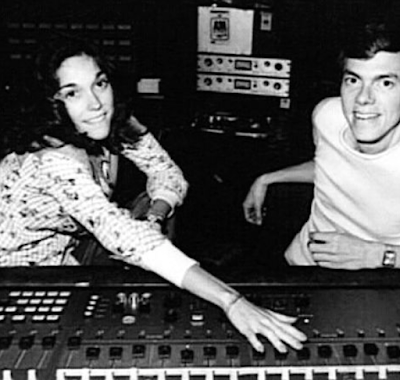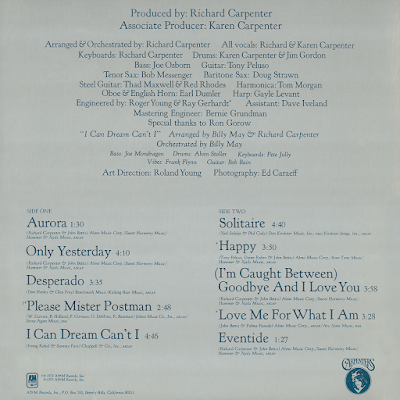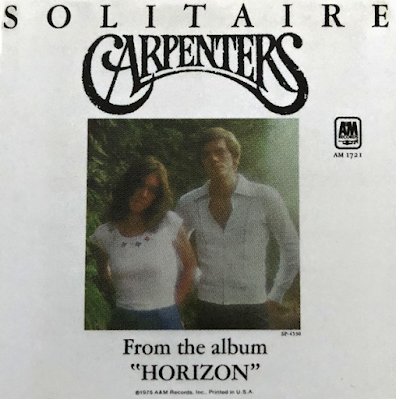Early 1975.
This was a very classy thing to do.
Draggy or brilliant or something in between?
Everything concerning this particular record creates one of the most intriguing stories in the Carpenters history, transforming the course of their art, their career, and their lives. (The song also had a huge impact on me personally.) To go back to an earlier question, how does it all to compare to the controversy and influence of the recording and immediate non-release of the Karen Carpenter solo album? Keep reading.
In 1974, during a tour in England, Karen and Richard joined Sedaka for a party thrown at his home. The guest list included among others, Paul McCartney, Rod Stewart, and Elton John along with his manager. Neil's recent Laughter in the Rain was a modest hit in the U.K., and by September of that year, Sedaka signed with Elton John's new label Rocket Records hoping to have similar success back in his homeland. Karen and Richard must have liked Sedaka quite a bit as they would begin a series of activities with him both professional and charitable.
At some point, being a connoisseur of music and a lover of radio, Richard ran across Neil's version of Solitaire, tucking it back in his mind as a potential song for the next record. He is quoted as spending two weeks on the mix of the song, wanting to get it just right as he was using new techniques. The result was impressive- and divisive in more ways than one.
Smiling photo for the sheet music. A very interesting choice.
Although it is admittedly slow, there's not a hint of Easy Listening schmaltz in either Karen's phrasing or Richard's arrangement. It builds to a magnificent conclusion, with soaring strings and a stunning vocal that goes from great highs to spellbinding lows and perhaps the longest held note Karen has ever put to disc. It may be a controversial record among hard core fans, but I find it to be an absolutely exquisite piece of craftsmanship. Other singers tend to agree. Solitaire's been covered by a wide range of artists, everyone from Andy Williams to Petula Clark, Shirley Bassey to Sheryl Crow, Elvis Presley to Jann Arden tried to make it their own. Most recently, Josh Groban took his turn at the helm on his 2020 album, Harmony.
Screenshot from Phil Cody's book, Beyond Words and Music.
The lyricist of the song, Phil Cody, said it best, "I sat down one day and I listened to all 90 versions of "Solitaire" that people have done, and of all the ones that are out there, Karen Carpenter's is still the one that is the benchmark for all the covers on that song. " His additional quote, in his book Beyond Words and Music, shown in the photo above, gives even more of his impression of the Carpenters recording.
Sedaka himself would eventually give the duo much deserved credit for what they created with one of his signature songs. Over 40 years later in a recommendation for the book "Some Kind of Lonely Clown", by Joel Samberg, Neil would write,
"An insightful look at the life of Karen Carpenter, a singing hero of mine. I had the pleasure of opening for the Carpenters in 1975, but it was more exciting that they recorded several of my songs, particularly "Solitaire", which featured a breathtaking Karen vocal accompanied by Richard's magnificent orchestration. Mr. Samberg's book is a worthy tribute to her everlasting legacy as one of the greatest vocalists of all time."
Wisdom and humility can come with age. Neil would also speak of
Solitaire and the Carpenters in his 2020 video
here.
In between its release as a single and Sedaka's glowing review come the problems.
The first is why this song was released as a single at all. On paper, the match sounds great. As hot as Sedaka was at the time with Captain & Tennille's breakthrough Love Will Keep Us Together and his own Laughter in the Rain hitting Number One a few months earlier, the duo's record is almost 5 minutes long. A no-no for Top 40 radio at the time and a stretch for the FM side of the dial. A better choice would have been for its flip side, Love Me For What I Am to be the "A" Side. Definitely a selection more radio friendly with its shorter length, easily accessible lyrics, and a stunning guitar solo by Tony Peluso.
The next problem involves timing. The old school sounding ballad was serviced to radio in the middle of the Summer, which would have made a great time for Happy if it had not already been released. That made no sense. Perhaps everyone involved thought Only Yesterday would last longer on the charts than it did. If so, this would have pushed the pipe organ and guitar enhanced record into the Fall for its release, a much more timely fit for such a serious song to chart. (Although the single has more bite, I prefer the original over the single remix as I more enjoy the more prominent sweeping strings over what was later added.)
At the Riviera in Las Vegas.
Big trouble ahead.
Solitaire debuted solidly at #76 on the August 2 Billboard chart. This was encouraging for a third single, as Only Yesterday had made its debut at #74, and Postman before it at #77. By mid-August as the new single was going up the charts and nearing the Top 20, Neil Sedaka was the opening act for Karen and Richard in Las Vegas. His portion of the show was very strong with his brilliant performance, but his ego was in equally full display as he broke some industry protocol. For both reasons it seems, Sedaka was quickly fired by manager Sherwin Bash at the insistence of Richard. Aside from snide reviews of their music and appearance, the Carpenters rarely received bad press. This was an exception, and the single moved up one more week to #17 before it began its quick decline- along with the album- logging only 10 weeks on the Top 100 charts.
When looking at the Billboard chart of September 6th, other ballads were in heavy rotation and in the Top Ten. These included Janis Ian's reflective At Seventeen and Barry Manilow's classically inspired Could It Be Magic. Both these records seemed to plod along, so Karen and Richard were not the only ones to release singles that seemed to be a bit slow and repetitive. The "Sedaka incident" must have had an effect on the chart performance of Solitaire as disc jockeys seemed all too willing to speak of the fiasco while station directors concurrently dropped the single from rotation. A perfect storm.
The Riviera's promotional folder.
The pairing was good for the audience, but a disaster for Karen and Richard.
I had heard of this on the radio, but I really did not understood its impact either short or long term. When the next fan club newsletter explained everything from the duo's perspective, and I happily took Richard's words at face value. When I met Karen backstage in 1976 at the Riviera, forgetting the drama associated with it because A Kind of Hush had just been released, I innocently mentioned Solitaire being one of my favorites. She graciously replied, "I'm glad you like it". Now, I understand her response... and I'm so sorry I poured salt in the wound.
Karen and Terry Ellis, new godparents at the Christening for a friend's baby.
Photographer unknown.
Where was manager Sherwin Bash or even the label executives when it was first suggested the duo tour with Sedaka? Why did it take someone from a competing label to offer advice? According to Terry Ellis, Karen's boyfriend and Chrysalis Records executive, the act had not been trained in even the most rudimentary basics of performing in front of a live audience. In contrast, with decades behind him, Sedaka was known to be high energy and a force to be reckoned with. Was pairing them just human oversight or intentional sabotage? (More about their combined show here.)
As it all played out, after his dismissal, Sedaka rode to new heights in popularity, beginning with a tour of his own, new management that made the most of the event, and the brand new single Bad Blood featuring new label head Elton John.
When Neil's new album, The Hungry Years was released, the industry's premier magazine recognized Richard for providing the "lush string arrangements". His craftsmanship helped make the ballad version of Breaking Up is Hard to Do one of the album's standouts. Of course, the work on Sedaka's record was done during a growing friendship long before the disastrous tour. This was the first time either Richard or Karen had collaborated on record with another artist, and it would be the very last time until a partnership with singer B.L. Mitchell when Richard produced (and Karen co-produced) Where I Want to Be and a remake of Venus in 1978.
The loss of a growing personal friendship aside, it's really unfortunate as Neil with Howard Greenfield or Phil Cody wrote some simply incredible songs that were firmly in the beloved duo's wheelhouse. This could have made a great pairing akin to the Carpenters work with Paul Williams and Roger Nichols or later with Leon Russell. Can you imagine Karen singing The Hungry Years? Absolutely. You don't need Richard's gift in choosing the perfect song for her in order to hear Karen create the definitive version.
Photographer unknown. Color corrections by Harry at the Corner.
I'm reminded of Richard's recent comment of he and Karen being "high ego but low self-esteem" here, and his temper may be what caused him to react quickly by getting Bash to fire Sedaka.
You can't blame Richard for taking action and doing something, but his emotions got the best of him. This disastrous choice squarely falls on management's shoulders who all too often left Karen and Richard on their own to figure it all out. Not even 30 years old, they were too young to understand the long term damage the firing would bring. To handle all the stresses that came with their fame would be something that even emotionally mature adults would not be able to navigate without adequate counsel and support.
Regardless of how the events happened, I'm sure everyone involved would have handled themselves much differently. Now decades later, hopefully amends have been made and forgiveness offered. It's a gift offered us through the Messiah of the world- the God made man in Jesus, and in the spirit of Christmas and its true meaning, it's one we can also extend to one another.
Why have I taken so much time to speak of Solitaire and Neil Sedaka? Simply, these events amounted to a watershed moment, changing the duo's trajectory in each area of their lives.
Writer Tom Nolan, in his Rolling Stone cover story on the group in July of 1974 seemed to predict what would come into full bloom about a year later, "The Carpenters have real pressures and problems, hard feelings and confusions which few would associate with the image of the group. Richard and Karen themselves are far from fully acknowledging these feelings. They suffer under strains which even they only dimly comprehend."
Richard lost confidence in his abilities to not only choose or write great material but also in his assuredness when it came to arranging and production. This may have reflected burnout and a temporary loss of love for what he was created to do. The albums following Horizon lacked much of the innovation and style that made the duo great. The next one seemed to be a knee-jerk reaction to perceptions about their image and the heaviness of the earlier disc and its subsequent lack of sales, or they reeked of a sense of desperation by hopping on the latest trend. Being that both siblings closely followed the sales numbers, it would be easy to see that the lower peak and mere 18 weeks Horizon stayed on the charts was a fraction of the time the previous new album Now & Then accomplished (41 weeks). Things looked even bleaker when comparing this elegant work with their earlier hit albums. A&M dropped the ball. There's no way after their hit albums and singles, a new LP by the world renowned superstars coming off an amazing hot streak should only reach Number 13 on the charts in their home country.
Karen internalized it all and continued to plummet into the depths of anorexia. Her downhill slide was just beginning, and shortly after recent events was confined to a period of extended bed rest. A very profitable tour to Japan and the U.K. was cancelled including a Royal Command Performance for the Queen Elizabeth II of England. The damage was ongoing. Radio now had what seemed to be a valid reason to not play up their latest records.
Terry Ellis, who temporarily became their new manager, accompanied Richard on an overseas media trip to apologize. After that, it seems the duo disappeared from the public eye, although Richard ventured out to the Roxy theater in Los Angeles that October to see the opening show of Hall & Oates.
Although Horizon was an album of firsts, it was also an album of lasts:
It'd be the last time a Carpenters single would reach the Top Ten in the US with Only Yesterday being their last one to certify Gold. This would also be the last Top 20 album for the duo in the US. From a creative angle, keeping their excellent Christmas albums in a separate category, Horizon would be the last truly great Carpenters pop album. They would continue selling strongly in the U.K. and Japan in particular, but back home, the hits would not be as easy to come by.
On a personal note, when I first heard Solitaire, I seemed to take instant ownership of its lyrics. A long standing unrequited love of the past year added a new depth to my ongoing in and outs of depression due to abuse and the nagging belief I'd never find the girl to share life with. My dreams of being a Disney Imagineer vanished after a visit with one backstage at Disneyland, leaving me up in the air about my future. Toss in a brief time of some periodic drinking, and combined with everything else, my last remnant of hope disappeared. I struggled for the next two years to gain some ground. Even now, there are times that Horizon - and especially Solitaire - emotionally takes me to a place I do not want to go, so I am glad to have completed this review and the many hours I spent repeatedly listening to its contents. Oh, the power of great music! My life is blessed to say the least, but sadness can overwhelm me at times. (Does that happen to you? If so, take a look at this post I wrote about depression. It may be of help.) At the very least, listening to this collection of fine songs makes me really miss Karen and her amazing voice and all that should have come.

Great quality large photo.
Special thanks to the anonymous sender.
















































